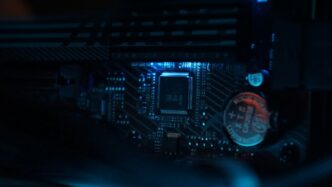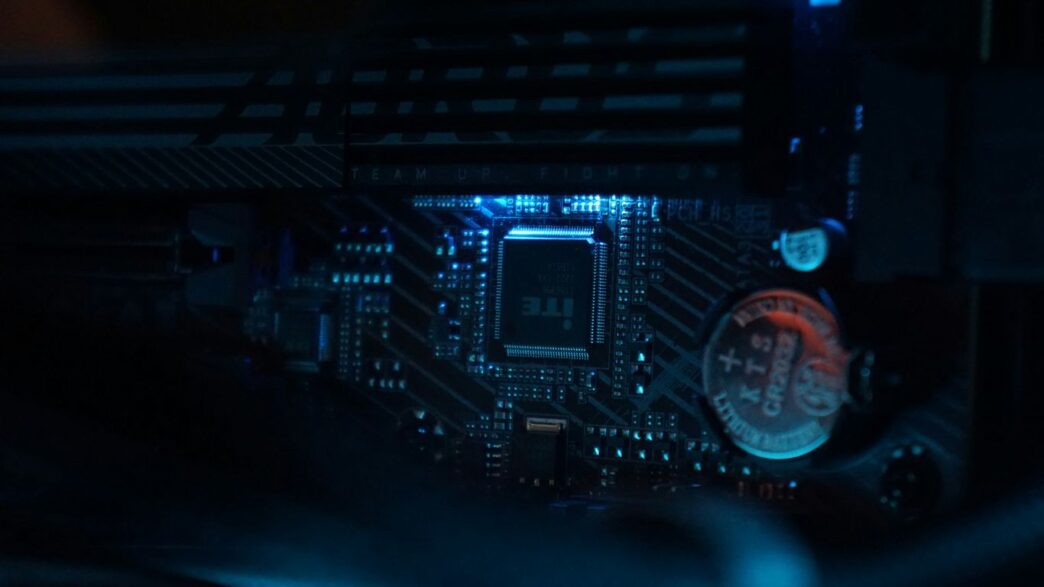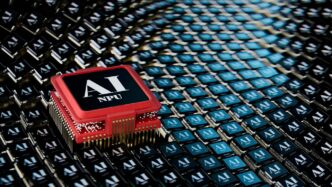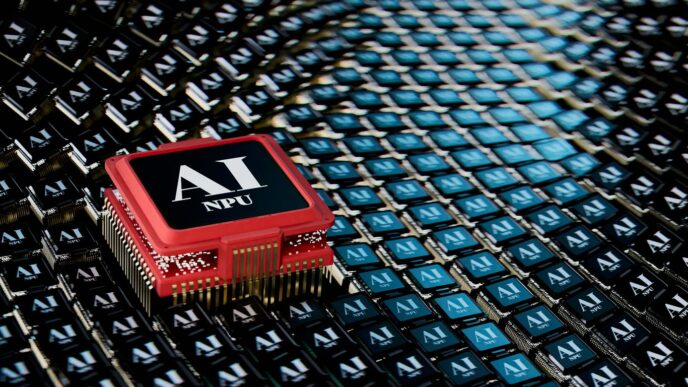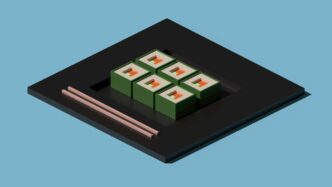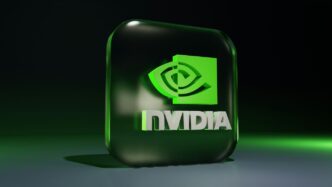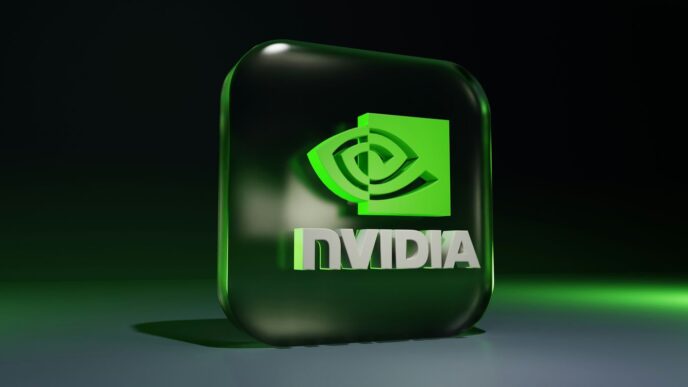So, quantum computers. They’re not just faster versions of the computers we use every day. It’s like comparing a bicycle to a rocket ship – totally different. The real excitement comes from how they can tackle problems that would take regular computers ages, if they could even solve them at all. This difference in speed and capability is what we call quantum advantage, and it’s a pretty big deal for a lot of different fields.
Key Takeaways
- Quantum advantage means a quantum computer can solve a specific problem much better or faster than any regular computer can.
- This speed-up isn’t for everything; it’s for certain types of complex tasks like breaking codes or simulating molecules.
- Developing better quantum hardware and software is key to making these speed advantages practical.
- Quantum computers promise big changes in areas like creating new medicines, making materials, and improving logistics.
- While still developing, quantum computing is moving from theory to real use, with potential to reshape many industries.
Understanding Quantum Computer Speed Advantages
So, what’s the big deal with quantum computers being faster? It’s not just about making things happen quicker; it’s about tackling problems that are practically impossible for even the most powerful regular computers we have today. Think of it like trying to find a specific grain of sand on a beach versus finding a specific grain of sand on a beach that’s also underwater. The scale of the challenge is just different.
Defining Quantum Advantage
At its core, quantum advantage is when a quantum computer can solve a specific problem significantly better, faster, or cheaper than any classical computer could. It’s not a blanket statement that quantum computers are always superior. Instead, it’s about finding those specific tasks where they truly shine. These tasks often involve complex calculations that grow exponentially harder for classical machines as the problem size increases. For instance, breaking down very large numbers into their prime factors, which is the basis for much of our current online security, is one such area. This task, known as factorization, is where quantum computers show a dramatic potential speed-up.
Quantum Utility Versus Quantum Advantage
It’s important to distinguish between quantum utility and quantum advantage. Quantum utility is achieved when a quantum computer can provide reliable answers to problems that are beyond the reach of brute-force classical methods, even if those classical methods are highly specialized. IBM, for example, demonstrated quantum utility back in 2023. Quantum advantage, on the other hand, is a higher bar. It means not just solving a problem beyond classical reach, but doing so in a way that offers a significant, practical benefit over all known classical approaches. Researchers are aiming for widespread quantum advantage by around 2026, but this requires continued collaboration between quantum and high-performance computing communities.
Here’s a simple way to think about it:
- Quantum Utility: A quantum computer solves a problem that classical computers struggle with, providing a useful new tool for exploration.
- Quantum Advantage: A quantum computer solves a problem so much better than any classical computer that it creates a real-world, practical benefit.
Benchmarking Against Classical Systems
To actually prove quantum advantage, we need to compare quantum computers directly with their classical counterparts. This involves careful testing and measurement. Researchers use metrics like ‘layer fidelity’ and ‘circuit layer operations per second’ (CLOPS) to gauge performance. By running the same complex problems on both types of machines, scientists can quantify the speed-up and identify the specific problem types where quantum systems truly outperform. This rigorous benchmarking is how we move from theoretical possibilities to demonstrable capabilities, like the advancements in microchip technology that allow light pulses to travel at incredible speeds faster-than-light speeds on a microchip.
Developing more stable and scalable quantum processors is a big part of this, alongside improvements in the software that controls them. It’s a complex interplay of hardware and software maturity that will ultimately determine when and where we see practical quantum advantage.
Key Areas Benefiting From Quantum Speed

Quantum computers aren’t just a theoretical curiosity; they’re starting to show real promise in tackling problems that have stumped even the most powerful traditional computers. This speed advantage means we can look at solving some pretty complex issues in a whole new way.
Cryptography and Secure Communications
One of the most talked-about areas is cryptography. You know how we use complex math problems to keep our online information safe? Well, quantum computers could potentially break many of those codes much faster than anything we have now. This is a big deal for national security and online privacy. But it’s not all bad news. Researchers are also developing new "quantum-resistant" encryption methods that should be safe even from quantum attacks. It’s a bit of an arms race, but with potentially much more secure communication in the end.
Here’s a quick look at the situation:
- Quantum computers could break current encryption standards. This is due to algorithms like Shor’s algorithm, which is very good at factoring large numbers – a task that underpins much of today’s security.
- New quantum-resistant cryptography is being developed. These are mathematical approaches designed to be secure against both classical and quantum computers.
- Quantum Key Distribution (QKD) offers a different approach. It uses the principles of quantum mechanics to share encryption keys, making any eavesdropping attempt detectable.
Drug Discovery and Materials Science
Imagine being able to perfectly simulate how molecules interact. That’s where quantum computers really shine. Right now, figuring out how new drugs will work or what properties a new material might have involves a lot of trial and error, both in the lab and with computer simulations that are still approximations. Quantum computers could simulate these interactions with incredible accuracy. This could speed up the discovery of new medicines, help design materials with specific traits (like better batteries or stronger alloys), and generally make scientific research much faster and more efficient.
- Molecular Simulation: Quantum computers can model the behavior of atoms and molecules with high fidelity, something classical computers struggle with for complex systems.
- Accelerated Discovery: This allows for faster screening of potential drug candidates and the design of novel materials with desired properties.
- Reduced Trial and Error: By providing more accurate predictions, quantum computing can significantly cut down on the expensive and time-consuming experimental process.
Optimization and Logistics
Many real-world problems involve finding the best possible solution from a huge number of options. Think about planning delivery routes for a fleet of trucks, managing complex financial portfolios, or even optimizing traffic flow in a busy city. These are all "optimization" problems. Classical computers can get stuck trying out too many possibilities. Quantum computers, with their ability to explore many states at once, could find the optimal solution much more quickly. This could lead to more efficient supply chains, better financial planning, and smoother city operations.
Consider these examples:
- Supply Chain Management: Finding the most efficient routes and schedules for goods movement.
- Financial Portfolio Optimization: Selecting investments to maximize returns while minimizing risk.
- Traffic Flow: Developing real-time strategies to reduce congestion and travel times.
Advancements in Quantum Computing
Quantum computing is really moving forward, and it’s pretty exciting to see. We’re not just talking about theory anymore; actual quantum hardware is being built and tested by big names like IBM and Google. These aren’t your grandpa’s computers, that’s for sure. They use some pretty wild ideas from quantum physics to crunch numbers in ways that are just not possible with the silicon chips we use every day.
Hardware and Software Maturity
Right now, a lot of the work is focused on making the actual quantum machines better. Think of it like building a super-fast race car. You need a powerful engine, a strong chassis, and all the right controls. In quantum computing, the "engine" is made of things called qubits. Different companies are trying different ways to build these qubits, like using tiny superconducting circuits or trapping individual atoms with lasers. Each method has its own pros and cons, but the goal is the same: more stable qubits that can do more complex calculations for longer periods.
- Superconducting Qubits: These are like tiny electrical circuits that can be cooled down to near absolute zero. They’ve shown good results in terms of how long they can hold their quantum state (coherence time) and how accurately they perform operations (fidelity).
- Trapped Ions: Here, individual atoms are held in place using electric fields and manipulated with lasers. They’re known for their high accuracy in performing quantum operations.
- Photonic Qubits: These use particles of light. They have the advantage of being less sensitive to environmental noise but can be tricky to get to interact with each other.
On the software side, it’s about creating the tools and languages that let us tell these quantum computers what to do. It’s a whole new programming paradigm, and developers are working hard to make it more accessible.
Error Correction Challenges
One of the biggest headaches in quantum computing is that qubits are super sensitive. Even the slightest disturbance, like a tiny bit of heat or a stray magnetic field, can mess up the calculation. This is called decoherence, and it leads to errors. So, a huge part of the research is figuring out how to protect these delicate quantum states and correct errors when they happen. It’s a bit like trying to have a conversation in a hurricane – you need really good noise cancellation.
- Quantum Error Correction Codes: These are sophisticated methods designed to detect and fix errors without disturbing the quantum information itself.
- Fault Tolerance: The ultimate goal is to build quantum computers that are "fault-tolerant," meaning they can perform calculations reliably even with some level of errors occurring.
- Qubit Quality: Improving the inherent quality and stability of individual qubits is also a way to reduce the need for complex error correction.
The Role of Qubits and Superposition
So, what makes quantum computers so special? It all comes down to qubits. Unlike classical bits that are either a 0 or a 1, qubits can be both 0 and 1 at the same time. This is thanks to a quantum phenomenon called superposition. Imagine a coin spinning in the air – it’s neither heads nor tails until it lands. A qubit is like that spinning coin, existing in a mix of states. When you have many qubits working together, this ability to be in multiple states simultaneously allows quantum computers to explore a vast number of possibilities all at once. This parallel processing power is what gives quantum computers their potential speed advantage for certain types of problems. Another weird but useful quantum trick is entanglement, where qubits become linked, and the state of one instantly influences the state of another, no matter how far apart they are. These properties are what we’re trying to harness to solve problems that are currently impossible for even the most powerful supercomputers.
Real-World Applications of Quantum Computing

Quantum computing isn’t just a theoretical concept anymore; it’s starting to show up in practical ways across different fields. Think about it – problems that would take our current best computers ages to figure out might be solvable in a fraction of the time. This opens up a whole new world of possibilities.
Machine Learning and Artificial Intelligence
When it comes to AI and machine learning, quantum computers could really speed things up. They’re good at handling massive amounts of data and finding patterns that are hard for us to see. This means AI models could train much faster and become more accurate. Imagine AI that can learn from complex data sets in areas like medical diagnosis or financial forecasting with incredible speed. This ability to process information in new ways is a game-changer for AI development. We’re looking at AI systems that can tackle more complex problems, leading to breakthroughs in areas like image recognition and natural language processing. It’s also about making AI more secure, using quantum principles for unbreakable encryption, which is pretty neat when you think about protecting sensitive information.
Climate Modeling and Environmental Science
Climate change is a big one, and quantum computers could help us understand it better. Simulating complex climate systems involves a lot of variables and interactions. Quantum computers, with their ability to handle many calculations at once, can model these intricate systems more accurately. This means better predictions about weather patterns, sea-level rise, and other environmental changes. Policymakers could use this information to make smarter, more proactive decisions. It’s about getting a clearer picture of our planet’s future so we can act accordingly. This could also extend to optimizing energy grids and managing resources more efficiently.
Financial Market Analysis
Finance is another area where quantum computing is expected to make waves. Dealing with financial markets means looking at tons of data, predicting trends, and managing risk. Quantum computers can crunch these numbers much faster, helping with things like portfolio management and risk assessment. They can also help develop more secure financial transactions. The complexity of financial markets, with all their interconnected variables, is exactly the kind of problem quantum computers are suited for. This could lead to more stable markets and better investment strategies. We’re talking about a significant shift in how financial institutions operate and make decisions, potentially leading to more robust financial models.
Here’s a quick look at how quantum computing might impact financial analysis:
- Portfolio Optimization: Finding the best mix of investments to maximize returns while minimizing risk.
- Risk Management: More accurately assessing and predicting financial risks.
- Fraud Detection: Identifying fraudulent transactions with greater speed and accuracy.
- Algorithmic Trading: Developing faster and more sophisticated trading strategies.
The Future of Quantum Computing
So, what’s next for quantum computers? It’s a pretty exciting time, honestly. We’re moving beyond just theoretical ideas and seeing actual progress. The big goal is to get to a point where these machines can reliably solve problems that are just impossible for even the best regular computers we have today. That’s what people mean when they talk about ‘practical quantum advantage’.
Achieving Practical Quantum Advantage
Getting to practical quantum advantage isn’t just about building bigger machines. It’s about making them more stable and less prone to errors. Right now, quantum computers are pretty sensitive. Even a tiny bit of noise can mess up a calculation. So, a lot of work is going into what’s called ‘error correction’. Think of it like building a really robust system that can spot and fix mistakes as they happen. We’re seeing improvements in how long qubits can hold their state (coherence time) and how accurately operations are performed (fidelity). Companies are aiming for machines with thousands of qubits that are also fault-tolerant. IBM, for example, has plans for a machine called ‘IBM Quantum Starling’ by 2029, which is a step in that direction.
The Evolution of Quantum Algorithms
It’s not just the hardware that’s changing. The way we tell these computers what to do – the algorithms – are evolving too. New algorithms are being developed that can take advantage of quantum properties like superposition and entanglement to tackle specific problems more efficiently. For instance, in machine learning, researchers are looking at quantum algorithms that could speed up training or help AI models solve more complex tasks. Similarly, for drug discovery, new quantum simulation algorithms are being designed to model molecular interactions with much greater precision than before.
Transformative Potential Across Industries
When we finally get these powerful, reliable quantum computers, the impact could be huge. Imagine:
- Drug Discovery: Simulating molecules to design new medicines much faster.
- Materials Science: Creating novel materials with specific properties, like better batteries or superconductors.
- Finance: Optimizing investment portfolios or detecting fraud with incredible speed.
- Logistics: Solving complex routing and scheduling problems for supply chains.
- Cryptography: While breaking current encryption is a concern, quantum computing also drives the development of new, quantum-resistant security methods.
It’s a bit like the early days of classical computers. We’re still figuring out all the ways they’ll change our world, but the potential is definitely there for some really big shifts.
So, What’s Next?
We’ve talked a lot about how quantum computers can do things way faster than our regular computers for certain jobs. It’s not like they’ll replace your laptop for checking email, but for really tough problems, like figuring out new medicines or making complex systems work better, they’re a game-changer. We’re still working out the kinks, like making sure they don’t make too many mistakes, but the progress is really exciting. Think of it as a whole new tool that’s going to help us solve problems we couldn’t even touch before. It’s going to change a lot of industries, and we’re just starting to see what’s possible.
Frequently Asked Questions
What exactly is ‘quantum advantage’?
Quantum advantage is when a quantum computer can solve a specific problem much faster or better than even the best regular computers. It’s not about being better at everything, but about being super powerful for certain types of tasks, like figuring out complex molecular interactions or cracking tough codes.
How is quantum advantage different from quantum utility?
Think of quantum utility as a stepping stone. It means a quantum computer can solve a problem that’s really hard for regular computers, even if it’s not the absolute fastest way yet. Quantum advantage is the next level, where it’s clearly superior to all known methods used by regular computers.
Are quantum computers good for everyday tasks like browsing the internet?
Not really. Quantum computers are specialized tools designed for very complex problems that are practically impossible for regular computers. They won’t replace your laptop for everyday things like email or watching videos. Their strength lies in scientific research, advanced simulations, and solving intricate optimization puzzles.
What makes quantum computers so much faster for certain problems?
Quantum computers use ‘qubits’ instead of regular bits. Qubits can be both 0 and 1 at the same time, thanks to a quantum trick called superposition. This allows them to explore many possibilities simultaneously, giving them a massive speed boost for specific types of calculations that would take regular computers ages.
What are some real-world areas where quantum computers could make a big difference?
Quantum computers show promise in areas like discovering new medicines by simulating how molecules behave, creating advanced materials, making financial systems more secure and efficient, and solving complex logistical problems, like optimizing delivery routes for huge companies.
Are quantum computers ready for widespread use yet?
Quantum computing is still developing. While we’ve seen amazing progress and achieved ‘quantum utility’ in some areas, reaching ‘quantum advantage’ for many practical problems is still a work in progress. Building stable, error-free quantum computers is a major challenge scientists are actively working on.

